

Kunzea Bundles
Support your body's natural recovery with Roogenic's Kunzea Bundles, featuring Australian botanicals traditionally used to help relieve pain, inflammation, and everyday discomfort.
-

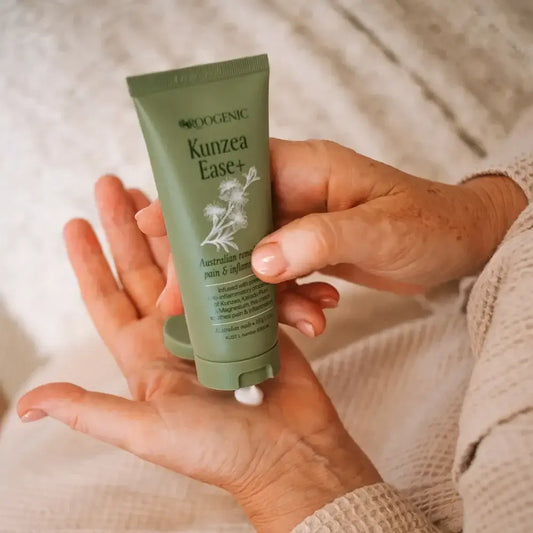 20-30% OFFPREORDER
20-30% OFFPREORDERKunzea Ease+ Cream
5.0Rated 5.0 out of 5 stars8 ReviewsRegular price From $27.96Regular priceUnit price / perWas $34.95Sale price From $27.96Kunzea Oil, Kakadu Plum, Magnesium, Lemon MyrtleSale20-30% OFFPREORDER -

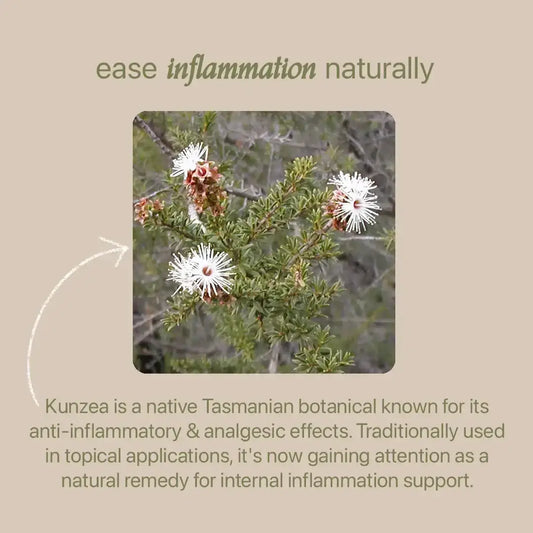 30% OFFPREORDERRegular price From $55.90Regular priceUnit price / per
30% OFFPREORDERRegular price From $55.90Regular priceUnit price / perWas $79.85Sale price From $55.90Kunzea Ease+ Cream, Kunzea Relief Tea, Inflammation PowderSale30% OFFPREORDER -

 30% OFFPREORDERRegular price From $41.93Regular priceUnit price / per
30% OFFPREORDERRegular price From $41.93Regular priceUnit price / perWas $59.90Sale price From $41.93Kunzea Ease+ Cream, Inflammation PowderSale30% OFFPREORDER -
 30% OFFUnder 100 leftRegular price From $38.43Regular priceUnit price / per
30% OFFUnder 100 leftRegular price From $38.43Regular priceUnit price / perWas $54.90Sale price From $38.43Kunzea Ease+ Cream, Kunzea Relief TeaSale30% OFFUnder 100 left
Roogenic’s Inflammation Collection includes a variety of inflammation relief products tailored to your needs.

- Honey Eucalypt scent
- Traditionally used in Australian Indigenous medicine as an analgesic and anti-inflammatory
- Aid in the healing of minor muscle injuries
- Help promote and maintain skin health and hydration
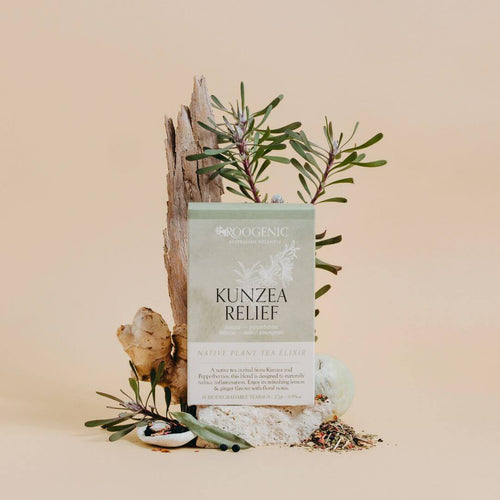
- Zesty lemon-ginger infusion
- Turmeric Free
- Contains Kunzea
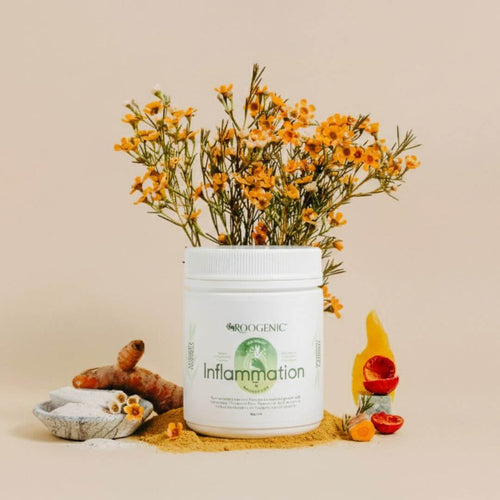
- Tropical & spiced blend
- Fortigel Collagen
- Contains Turmeric
- Contains Magnesium
Discover the powerful healing properties of Kunzea from our farming partner on Flinders Island, home to some of the world's purest, most potent Kunzea plants.
Our Tasmanian harvest partners work with deep respect for the land, ensuring sustainable wildcrafting practices that protect native ecosystems while delivering the highest quality botanical ingredients.
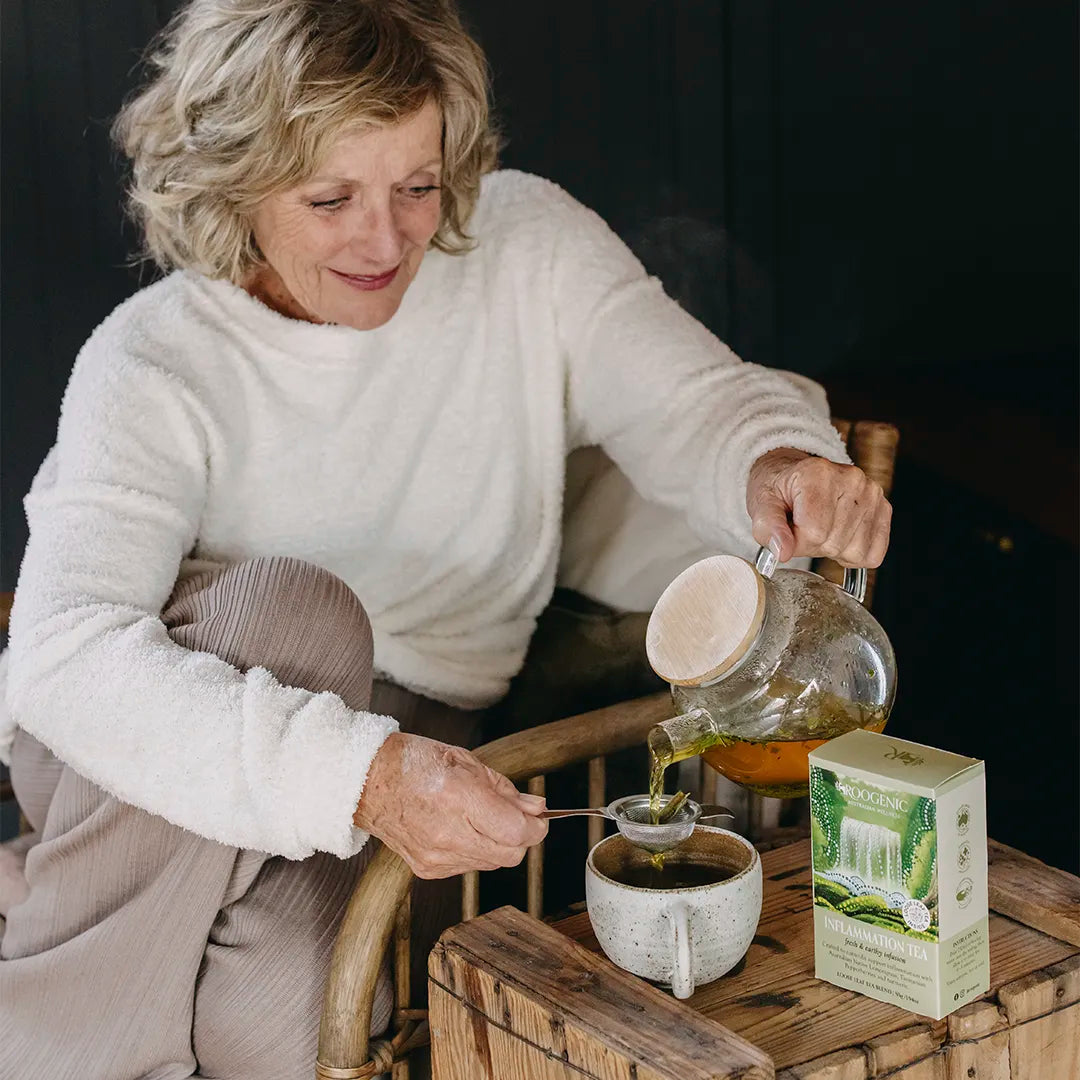
Why Inflammation Relief Matters
Chronic inflammation impacts more than just your joints. A healthy inflammation response is essential for:
Immune Function
Promoting a balanced immune response.
Reducing stiffness and supporting mobility.
Reducing fatigue, skin issues and mood changes.
When your inflammation levels are out of balance, you may experience symptoms like joint stiffness, low energy, fatigue, skin issues, and mood changes. Roogenic’s products are thoughtfully crafted to help support a healthy inflammation response, promote mobility, and provide lasting relief using natural remedies.
Australian Wellness Journal
-

Kunzea: The Next Big Anti-Inflammatory Superfood
Inflammation is a common underlying factor in many health issues, from joint discomfort to immune system imbalances. While conventional treatments are prevalent, there's a growing interest in natural alternatives. One such promising native Australian plant is Kunzea. Known scientifically as Kunzea ambigua, this Tasmanian-grown shrub is gaining attention for its potential anti-inflammatory properties, traditional uses, and unique aromatic compounds. Let's delve into why Kunzea is emerging as Australia's next wellness superfood and how Roogenic is at the forefront with its new Kunzea Relief Tea. Discover Kunzea: Nature’s New Anti-Inflammatory Hero When it comes to finding natural, effective ways to soothe inflammation, nature often holds the answers. And now, a lesser-known native plant is stepping into the spotlight: Kunzea. Traditionally used by Indigenous Australians to calm the body and spirit, this Tasmanian-grown botanical is being recognised for its impressive anti-inflammatory potential. In this article, we’ll explore the science behind Kunzea’s benefits, how it works in the body, and why it’s fast becoming one of the most exciting natural inflammation remedies. What Is Kunzea? Kunzea (from the Myrtaceae family), also known as Tick Bush or White Cloud, is a hardy, aromatic shrub native to Australia, particularly Tasmania. Indigenous Australians have long used different parts of the plant: Leaves to treat wounds Paste to repel insects Flowers as a natural sweet treat Branches for shelter and protection While traditional evidence is passed down orally, making it difficult to find written documentation, this plant has deep roots in cultural wellness practices. The Science Behind Kunzea’s Anti-Inflammatory Power Kunzea was officially registered by the TGA (Therapeutic Goods Administration) in 1999 for external use. Its essential oil is approved for the temporary relief of: Arthritis and rheumatism Influenza symptoms Muscular aches and pains Nervous tension and stress But what about using Kunzea internally? While human studies are limited, preliminary research (Barillot & Cock, 2021) suggests Kunzea extracts are non-toxic, showing no harm in early testing models using brine shrimp larvae. This is an early, but promising step toward understanding its internal benefits. What Makes Kunzea a Potential Anti-Inflammatory Superfood? The magic of Kunzea lies in its active compounds, particularly monoterpenes and sesquiterpenes, which have known therapeutic benefits. Key Anti-Inflammatory Compounds in Kunzea 1. Alpha-pinene (a-pinene) Calms inflammation by reducing pro-inflammatory signals like TNF-α and IL-6 Supports antioxidant activity to neutralise free radicals Helps regulate immune response to avoid overreactions Commonly found in pine forests – hence the grounding, earthy aroma 2. 1,8-Cineole (Eucalyptol) Acts as a natural bronchodilator – clears and relaxes the lungs Reduces inflammation by calming TNF-α and IL-1β Shows antibacterial, antiviral, and immune-supporting properties Potential to support autoimmune inflammation by modulating bacterial triggers 3. Limonene and Citronellol (in smaller amounts) Support mood balance and detoxification pathways Offer anti-microbial and insect-repelling effects 4. Globulol and Viridifloral Show potential for anti-fungal, anti-oxidant, and even anti-cancer effects Contribute to Kunzea’s broad-spectrum wellness potential How Kunzea Compares to Other Anti-Inflammatory Remedies Remedy Key Compounds Benefits Considerations Kunzea a-pinene, 1,8-cineole Immune modulation, pain relief, lung support Emerging internal research Turmeric Curcumin Powerful anti-inflammatory and antioxidant Needs black pepper to absorb Ginger Gingerols Digestive and inflammation support Strong taste for some Willow Bark Salicin Natural pain relief Not suitable for everyone (aspirin-like effects) What sets Kunzea apart is its dual impact, soothing both inflammation and tension, plus its link to bioregional herbalism, the belief that local plants are more energetically aligned with those who live nearby. Kunzea and Bioregional Herbalism Bioregional herbalism advocates for the use of native plants that are energetically and ecologically aligned with the local environment and its inhabitants. Kunzea, thriving in Australian ecosystems, exemplifies this practice: Why This Matters: Environmentally aligned: Better sustainability, lower carbon footprint Energetically resonant: A deeper connection to the land we live on Wildlife friendly: Kunzea nectar is a seasonal favourite for birds and bees Eco-Friendly and Wildly Resilient Kunzea is not just a gift to your body, it’s a gift to the earth: Hardy Growth: Thrives in poor soil conditions Rapid Maturation: Grows quickly, ensuring a sustainable supply Wildlife Friendly: Attracts native fauna during its flowering season At Roogenic, we proudly support sustainable Australian farming, choosing Tasmanian Kunzea to ensure you’re getting the highest quality, most potent plant medicine possible. Roogenic’s Kunzea Relief Tea: A Natural Choice Our Kunzea Relief Tea is crafted using Tasmanian-grown Kunzea, selected for its superior concentration of beneficial compounds. This blend is: Caffeine-Free: Suitable for any time of day Bitter-Free: Offers a pleasant taste without the need for sweeteners Easy to Incorporate: Ideal for daily wellness routines While current research on the internal use of Kunzea is in early stages, our tea is formulated with care, using parts of the plant traditionally consumed. We recommend consulting with a healthcare professional before incorporating new herbal products into your regimen. Explore More About Inflammation For more insights into managing inflammation naturally, explore our other articles: How To Reduce Inflammation Naturally Symptoms of Inflammation The Connection Between Sleep and Inflammation
Read moreKunzea: The Next Big Anti-Inflammatory Superfood
Inflammation is a common underlying factor in many health issues, from joint discomfort to immune system imbalances. While conventional treatments are prevalent, there's a growing interest in natural alternatives. One such promising native Australian plant is Kunzea. Known scientifically as Kunzea ambigua, this Tasmanian-grown shrub is gaining attention for its potential anti-inflammatory properties, traditional uses, and unique aromatic compounds. Let's delve into why Kunzea is emerging as Australia's next wellness superfood and how Roogenic is at the forefront with its new Kunzea Relief Tea. Discover Kunzea: Nature’s New Anti-Inflammatory Hero When it comes to finding natural, effective ways to soothe inflammation, nature often holds the answers. And now, a lesser-known native plant is stepping into the spotlight: Kunzea. Traditionally used by Indigenous Australians to calm the body and spirit, this Tasmanian-grown botanical is being recognised for its impressive anti-inflammatory potential. In this article, we’ll explore the science behind Kunzea’s benefits, how it works in the body, and why it’s fast becoming one of the most exciting natural inflammation remedies. What Is Kunzea? Kunzea (from the Myrtaceae family), also known as Tick Bush or White Cloud, is a hardy, aromatic shrub native to Australia, particularly Tasmania. Indigenous Australians have long used different parts of the plant: Leaves to treat wounds Paste to repel insects Flowers as a natural sweet treat Branches for shelter and protection While traditional evidence is passed down orally, making it difficult to find written documentation, this plant has deep roots in cultural wellness practices. The Science Behind Kunzea’s Anti-Inflammatory Power Kunzea was officially registered by the TGA (Therapeutic Goods Administration) in 1999 for external use. Its essential oil is approved for the temporary relief of: Arthritis and rheumatism Influenza symptoms Muscular aches and pains Nervous tension and stress But what about using Kunzea internally? While human studies are limited, preliminary research (Barillot & Cock, 2021) suggests Kunzea extracts are non-toxic, showing no harm in early testing models using brine shrimp larvae. This is an early, but promising step toward understanding its internal benefits. What Makes Kunzea a Potential Anti-Inflammatory Superfood? The magic of Kunzea lies in its active compounds, particularly monoterpenes and sesquiterpenes, which have known therapeutic benefits. Key Anti-Inflammatory Compounds in Kunzea 1. Alpha-pinene (a-pinene) Calms inflammation by reducing pro-inflammatory signals like TNF-α and IL-6 Supports antioxidant activity to neutralise free radicals Helps regulate immune response to avoid overreactions Commonly found in pine forests – hence the grounding, earthy aroma 2. 1,8-Cineole (Eucalyptol) Acts as a natural bronchodilator – clears and relaxes the lungs Reduces inflammation by calming TNF-α and IL-1β Shows antibacterial, antiviral, and immune-supporting properties Potential to support autoimmune inflammation by modulating bacterial triggers 3. Limonene and Citronellol (in smaller amounts) Support mood balance and detoxification pathways Offer anti-microbial and insect-repelling effects 4. Globulol and Viridifloral Show potential for anti-fungal, anti-oxidant, and even anti-cancer effects Contribute to Kunzea’s broad-spectrum wellness potential How Kunzea Compares to Other Anti-Inflammatory Remedies Remedy Key Compounds Benefits Considerations Kunzea a-pinene, 1,8-cineole Immune modulation, pain relief, lung support Emerging internal research Turmeric Curcumin Powerful anti-inflammatory and antioxidant Needs black pepper to absorb Ginger Gingerols Digestive and inflammation support Strong taste for some Willow Bark Salicin Natural pain relief Not suitable for everyone (aspirin-like effects) What sets Kunzea apart is its dual impact, soothing both inflammation and tension, plus its link to bioregional herbalism, the belief that local plants are more energetically aligned with those who live nearby. Kunzea and Bioregional Herbalism Bioregional herbalism advocates for the use of native plants that are energetically and ecologically aligned with the local environment and its inhabitants. Kunzea, thriving in Australian ecosystems, exemplifies this practice: Why This Matters: Environmentally aligned: Better sustainability, lower carbon footprint Energetically resonant: A deeper connection to the land we live on Wildlife friendly: Kunzea nectar is a seasonal favourite for birds and bees Eco-Friendly and Wildly Resilient Kunzea is not just a gift to your body, it’s a gift to the earth: Hardy Growth: Thrives in poor soil conditions Rapid Maturation: Grows quickly, ensuring a sustainable supply Wildlife Friendly: Attracts native fauna during its flowering season At Roogenic, we proudly support sustainable Australian farming, choosing Tasmanian Kunzea to ensure you’re getting the highest quality, most potent plant medicine possible. Roogenic’s Kunzea Relief Tea: A Natural Choice Our Kunzea Relief Tea is crafted using Tasmanian-grown Kunzea, selected for its superior concentration of beneficial compounds. This blend is: Caffeine-Free: Suitable for any time of day Bitter-Free: Offers a pleasant taste without the need for sweeteners Easy to Incorporate: Ideal for daily wellness routines While current research on the internal use of Kunzea is in early stages, our tea is formulated with care, using parts of the plant traditionally consumed. We recommend consulting with a healthcare professional before incorporating new herbal products into your regimen. Explore More About Inflammation For more insights into managing inflammation naturally, explore our other articles: How To Reduce Inflammation Naturally Symptoms of Inflammation The Connection Between Sleep and Inflammation
Read more -
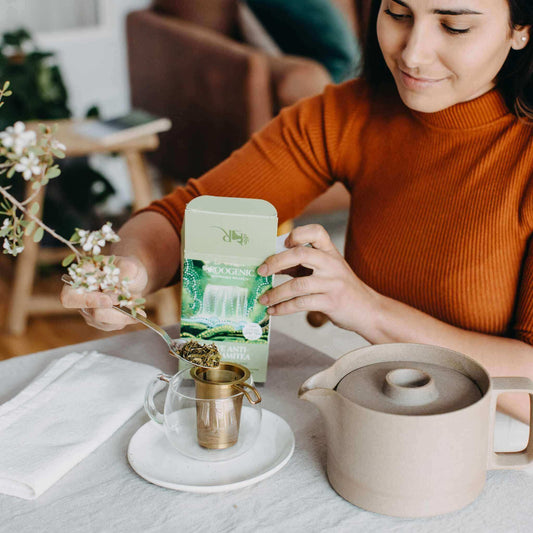
How To Reduce Inflammation Naturally
Inflammation is an umbrella term for a range of symptoms caused by your body as it tries to heal. Sometimes, inflammation will go away on its own when an injury heals. Other times, it might be an ongoing response to a weakened body, turning into a chronic problem. The good news is, you have more control over chronic inflammation than you think. With a few natural, non-intrusive methods, you can support and strengthen your body, significantly reducing the ongoing stress inflammation poses to your overall health. Top 5 Ways To Keep Inflammation In Check Naturally According To Our Naturopath: Omega 3 foods: Found in foods like fatty fish (salmon, mackerel), flaxseeds, and walnuts, omega 3 rich foods help reduce inflammation naturally by inhibiting the production of inflammatory molecules called eicosanoids and cytokines. Omega-3s, particularly EPA and DHA, modulate the immune response and promote the production of anti-inflammatory compounds, helping to reduce chronic inflammation, which is linked to various health conditions like heart disease, arthritis, and autoimmune disorders. Turmeric: Turmeric contains a compound called curcumin, which has powerful anti-inflammatory properties. Curcumin works by inhibiting inflammatory pathways, particularly by blocking molecules like NF-kB, which regulate inflammation at the cellular level. It also reduces the production of pro-inflammatory cytokines and enzymes. This makes turmeric effective in reducing chronic inflammation, which is associated with conditions like arthritis, heart disease, and other inflammatory disorders. Meditation: The practice of meditation can help reduce inflammation naturally by lowering stress levels, which are closely linked to inflammation. Regular meditation practices, such as mindfulness, activate the parasympathetic nervous system and reduce the production of stress hormones like cortisol. These hormonal changes can lead to a decrease in the body's inflammatory response. Meditation has also been shown to reduce pro-inflammatory cytokines, improving overall immune function and reducing chronic inflammation associated with conditions like heart disease, arthritis, and autoimmune disorders. Feed your good gut bacteria: Feeding your gut good bacteria, often through probiotics or fiber-rich foods, can help reduce inflammation naturally by promoting a healthy balance of gut microbiota. Beneficial bacteria support the production of short-chain fatty acids (SCFAs), such as butyrate, which have anti-inflammatory effects on the gut lining and immune system. A balanced gut microbiome reduces the growth of harmful bacteria that can trigger inflammation. By improving gut health, good bacteria help regulate immune responses and decrease chronic inflammation, which is linked to conditions like irritable bowel syndrome (IBS), obesity, and autoimmune diseases. Ginger: This plant can help reduce inflammation naturally due to its bioactive compounds, particularly gingerol, which has strong anti-inflammatory properties. Gingerol works by inhibiting pro-inflammatory molecules like cytokines and enzymes such as COX-2, which are involved in the inflammatory response. By blocking these pathways, ginger helps to lower inflammation in the body. This makes it beneficial for managing inflammatory conditions like arthritis, muscle pain, and even metabolic diseases such as diabetes. Recognising these lesser-known symptoms of inflammation empowers you to seek timely medical evaluation and intervention. Alongside conventional treatments, incorporating natural remedies into your wellness routine can complement your efforts to combat inflammation and promote overall health. One such natural remedy is Roogenic's inflammation range, which harnesses the power of Australian native plants known for their anti-inflammatory properties. Ingredients like Native Lemongrass, Lemon Myrtle, and Native River Mint have been traditionally used by Indigenous Australians for their medicinal benefits, including reducing inflammation and supporting digestive health.
Read moreHow To Reduce Inflammation Naturally
Inflammation is an umbrella term for a range of symptoms caused by your body as it tries to heal. Sometimes, inflammation will go away on its own when an injury heals. Other times, it might be an ongoing response to a weakened body, turning into a chronic problem. The good news is, you have more control over chronic inflammation than you think. With a few natural, non-intrusive methods, you can support and strengthen your body, significantly reducing the ongoing stress inflammation poses to your overall health. Top 5 Ways To Keep Inflammation In Check Naturally According To Our Naturopath: Omega 3 foods: Found in foods like fatty fish (salmon, mackerel), flaxseeds, and walnuts, omega 3 rich foods help reduce inflammation naturally by inhibiting the production of inflammatory molecules called eicosanoids and cytokines. Omega-3s, particularly EPA and DHA, modulate the immune response and promote the production of anti-inflammatory compounds, helping to reduce chronic inflammation, which is linked to various health conditions like heart disease, arthritis, and autoimmune disorders. Turmeric: Turmeric contains a compound called curcumin, which has powerful anti-inflammatory properties. Curcumin works by inhibiting inflammatory pathways, particularly by blocking molecules like NF-kB, which regulate inflammation at the cellular level. It also reduces the production of pro-inflammatory cytokines and enzymes. This makes turmeric effective in reducing chronic inflammation, which is associated with conditions like arthritis, heart disease, and other inflammatory disorders. Meditation: The practice of meditation can help reduce inflammation naturally by lowering stress levels, which are closely linked to inflammation. Regular meditation practices, such as mindfulness, activate the parasympathetic nervous system and reduce the production of stress hormones like cortisol. These hormonal changes can lead to a decrease in the body's inflammatory response. Meditation has also been shown to reduce pro-inflammatory cytokines, improving overall immune function and reducing chronic inflammation associated with conditions like heart disease, arthritis, and autoimmune disorders. Feed your good gut bacteria: Feeding your gut good bacteria, often through probiotics or fiber-rich foods, can help reduce inflammation naturally by promoting a healthy balance of gut microbiota. Beneficial bacteria support the production of short-chain fatty acids (SCFAs), such as butyrate, which have anti-inflammatory effects on the gut lining and immune system. A balanced gut microbiome reduces the growth of harmful bacteria that can trigger inflammation. By improving gut health, good bacteria help regulate immune responses and decrease chronic inflammation, which is linked to conditions like irritable bowel syndrome (IBS), obesity, and autoimmune diseases. Ginger: This plant can help reduce inflammation naturally due to its bioactive compounds, particularly gingerol, which has strong anti-inflammatory properties. Gingerol works by inhibiting pro-inflammatory molecules like cytokines and enzymes such as COX-2, which are involved in the inflammatory response. By blocking these pathways, ginger helps to lower inflammation in the body. This makes it beneficial for managing inflammatory conditions like arthritis, muscle pain, and even metabolic diseases such as diabetes. Recognising these lesser-known symptoms of inflammation empowers you to seek timely medical evaluation and intervention. Alongside conventional treatments, incorporating natural remedies into your wellness routine can complement your efforts to combat inflammation and promote overall health. One such natural remedy is Roogenic's inflammation range, which harnesses the power of Australian native plants known for their anti-inflammatory properties. Ingredients like Native Lemongrass, Lemon Myrtle, and Native River Mint have been traditionally used by Indigenous Australians for their medicinal benefits, including reducing inflammation and supporting digestive health.
Read more -

Sleep and Inflammation: The Importance of Quali...
In the hustle and bustle of modern life, sleep often takes a backseat. We prioritise work, socialising, and never-ending to-do lists over the restorative power of a good night's sleep. However, growing research shows that quality sleep plays a crucial role in reducing inflammation and can even be a key factor in preventing and managing various chronic diseases. What is inflammation? Inflammation is the body's natural response to injury or infection, crucial for healing and protecting against pathogens. However, when inflammation becomes chronic, it can contribute to the development of conditions like heart disease, diabetes, arthritis, and more. Chronic inflammation is known to often be fueled by lifestyle factors such as poor diet, stress, lack of exercise, and yes, inadequate sleep. So, how does sleep—or the lack thereof—affect inflammation? It all comes down to the intricate interplay between the nervous system, the immune system, and the endocrine system. The Connection Between Sleep and Inflammation During sleep, the body undergoes essential repair and maintenance processes. This includes the removal of waste products from cells, the consolidation of memories, and the regulation of hormone levels. One such hormone is cortisol, often referred to as the stress hormone. Cortisol levels typically follow a natural rhythm, peaking in the morning to wake us up and gradually decreasing throughout the day. However, chronic sleep deprivation can disrupt this rhythm, leading to persistently elevated cortisol levels. High cortisol levels, in turn, can promote inflammation by stimulating the release of inflammatory cytokines. Additionally, inadequate sleep can dysregulate the body's immune response. While we sleep, our immune system produces cytokines—proteins that help regulate inflammation and fight infection. Sleep deprivation can disrupt the balance of these cytokines, leading to an overactive inflammatory response. Furthermore, poor sleep can impair the function of the glymphatic system—a waste clearance system in the brain. During sleep, the glymphatic system flushes out toxins and metabolic byproducts, including those associated with inflammation. When sleep is insufficient, this clearance process is compromised, allowing these harmful substances to accumulate and potentially exacerbate inflammation in the brain and throughout the body. How Better Sleep Can Improve Inflammation So, what can we do to harness the anti-inflammatory power of sleep? The answer lies in prioritising sleep hygiene—the practices and habits that promote quality sleep. Here are some tips: Stick to a consistent sleep schedule, going to bed and waking up at the same time every day, even on weekends. Create a relaxing bedtime routine to signal to your body that it's time to wind down. Make your sleep environment comfortable, cool, dark, and quiet. Limit exposure to screens and stimulating activities before bedtime. Engage in regular exercise, but avoid vigorous activity too close to bedtime. Manage stress through relaxation techniques such as deep breathing, meditation, or yoga. Avoid caffeine close to bedtime and instead opt for a non-caffeinated herbal sleep tea or powder made with sleep-supporting ingredients that work in synergy to promote deep sleep By prioritising quality sleep and adopting healthy sleep habits, we can support our body's natural ability to reduce inflammation, promoting overall health and well-being. Remember, sleep isn't a luxury—it's a fundamental pillar of good health. So, tonight, let's make a commitment to prioritize our rest and reap the benefits of a healthier, inflammation-free life.
Read moreSleep and Inflammation: The Importance of Quali...
In the hustle and bustle of modern life, sleep often takes a backseat. We prioritise work, socialising, and never-ending to-do lists over the restorative power of a good night's sleep. However, growing research shows that quality sleep plays a crucial role in reducing inflammation and can even be a key factor in preventing and managing various chronic diseases. What is inflammation? Inflammation is the body's natural response to injury or infection, crucial for healing and protecting against pathogens. However, when inflammation becomes chronic, it can contribute to the development of conditions like heart disease, diabetes, arthritis, and more. Chronic inflammation is known to often be fueled by lifestyle factors such as poor diet, stress, lack of exercise, and yes, inadequate sleep. So, how does sleep—or the lack thereof—affect inflammation? It all comes down to the intricate interplay between the nervous system, the immune system, and the endocrine system. The Connection Between Sleep and Inflammation During sleep, the body undergoes essential repair and maintenance processes. This includes the removal of waste products from cells, the consolidation of memories, and the regulation of hormone levels. One such hormone is cortisol, often referred to as the stress hormone. Cortisol levels typically follow a natural rhythm, peaking in the morning to wake us up and gradually decreasing throughout the day. However, chronic sleep deprivation can disrupt this rhythm, leading to persistently elevated cortisol levels. High cortisol levels, in turn, can promote inflammation by stimulating the release of inflammatory cytokines. Additionally, inadequate sleep can dysregulate the body's immune response. While we sleep, our immune system produces cytokines—proteins that help regulate inflammation and fight infection. Sleep deprivation can disrupt the balance of these cytokines, leading to an overactive inflammatory response. Furthermore, poor sleep can impair the function of the glymphatic system—a waste clearance system in the brain. During sleep, the glymphatic system flushes out toxins and metabolic byproducts, including those associated with inflammation. When sleep is insufficient, this clearance process is compromised, allowing these harmful substances to accumulate and potentially exacerbate inflammation in the brain and throughout the body. How Better Sleep Can Improve Inflammation So, what can we do to harness the anti-inflammatory power of sleep? The answer lies in prioritising sleep hygiene—the practices and habits that promote quality sleep. Here are some tips: Stick to a consistent sleep schedule, going to bed and waking up at the same time every day, even on weekends. Create a relaxing bedtime routine to signal to your body that it's time to wind down. Make your sleep environment comfortable, cool, dark, and quiet. Limit exposure to screens and stimulating activities before bedtime. Engage in regular exercise, but avoid vigorous activity too close to bedtime. Manage stress through relaxation techniques such as deep breathing, meditation, or yoga. Avoid caffeine close to bedtime and instead opt for a non-caffeinated herbal sleep tea or powder made with sleep-supporting ingredients that work in synergy to promote deep sleep By prioritising quality sleep and adopting healthy sleep habits, we can support our body's natural ability to reduce inflammation, promoting overall health and well-being. Remember, sleep isn't a luxury—it's a fundamental pillar of good health. So, tonight, let's make a commitment to prioritize our rest and reap the benefits of a healthier, inflammation-free life.
Read more
Join the Roogenic community
Kunzea Relief Bundles | Natural Pain & Inflammation Support
Discover our complete range of Kunzea relief bundles, featuring Australia's most powerful native botanical for natural pain relief and inflammation support. Each carefully curated bundle combines our ARTG-listed Kunzea Ease+ Cream with complementary wellness products to deliver comprehensive relief for muscle pain, mild joint stiffness, and everyday discomfort.
Our Kunzea bundles harness the traditional use of Kunzea in Australian Indigenous medicine, offering natural anti-inflammatory support for active lifestyles. Whether you're seeking relief from muscle aches and pains, mild arthritis symptoms, mild nerve pain, post-workout recovery, or everyday wellness support, our therapeutic Kunzea bundles provide targeted natural solutions.
Kunzea Relief Bundle pairs our ARTG-listed anti-inflammatory cream with soothing Kunzea Relief Tea for daily comfort and wellness support. Perfect for those seeking natural muscle pain relief and joint support through both topical and internal botanical care.
Kunzea Recovery Bundle combines our therapeutic pain relief cream with Inflammation Powder for enhanced post-activity recovery. Ideal for athletes, active individuals, and anyone managing muscle sprains, strains, or minor muscle injuries naturally.
Kunzea Complete Relief Bundle offers our most comprehensive natural wellness solution, featuring Kunzea Ease+ Cream, Kunzea Relief Tea, and Inflammation Powder. This complete collection provides 360-degree support for muscle aches, mild joint stiffness, mild sciatica, and overall inflammation management.
Each bundle features sustainably sourced Australian native botanicals including Kunzea, Kakadu Plum, and Magnesium, delivering powerful antioxidant protection and skin health support. Our Kunzea products are formulated to help reduce symptoms of mild arthritis, mild osteoarthritis, muscle soreness, and mild nerve pain while supporting your body's natural healing processes.
Experience the power of Australian botanicals with Roogenic's Kunzea relief bundles - where ancient Indigenous wisdom meets modern therapeutic science for natural, effective pain and inflammation support.
Shop our Kunzea bundles today and save on complete natural relief solutions.









